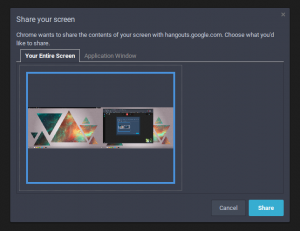There’s some good news for multi-monitor Linux users fed up at not being able to share a specific screen in apps like Google Meet and Discord.
A patch to add ‘screen enumeration’ to the Chromium browser has been accepted upstream and will, in the coming weeks, filter down to users of the browser as part of the Google Chrome 85 release.
Once there Chromium and Chromium-based apps (like Discord) will be able to support full screen sharing on Linux in a manner similar to that on Windows and macOS.
Not being a multi-monitor user, or someone who shares their screen often, I wasn’t aware of this particular limitation until recently.
So I’ll explain a bit more.
Chromium Screen Share on Linux
Presently, Linux users cannot share a specific screen in multi-monitor set-ups, not without using a workaround or two.
Screen sharing in Google Meet, Hangouts, and Discord (among others) still works, just there’s no way to only share a specific screen in a multi monitor set-up.
The assumption is that the screen picker dialog will show each monitor individually. Instead, on Linux, all screens are merged into a one master screen that’s (usually) very wide.
This issue does not affect Windows and macOS; users on other systems can pick which screen to share, with the other one kept hidden.
And I should also mention that the same issue affects Linux users relying on the Firefox web browser, too.
This particular issue has been around for a long, long time and is said to affect a wide variety of apps and services including Jitsi, Discord, Google Meet, Google Hangouts, the Screencastify Chrome extension, and more.
The good news is that the issue has been fixed in Chromium (the codebase of Google Chrome) and is already available to users of the developer channel. It will be part of the Chrome 85 release, due in August 2020.
So it won’t be too much longer before Linux users can enjoy proper screen sharing too.
H/T Cristian Á.B.

